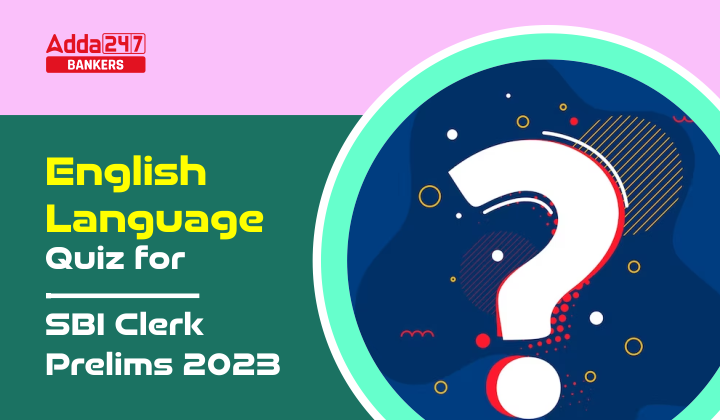Directions (1-10): Which of the following phrases among (I), (II), and (III) given below each sentence should replace the phrase/expression printed in bold to make the sentence grammatically correct? Choose the best option among the five given alternatives that reflect the correct use of phrase in the context of the grammatically correct sentence. If the sentence is correct as it is, mark “No correction required” as the answer.
Q1. Can Indian civil servants offered effectively in the country’s socio-economic development in the absence of specialisation within their ranks?
(I)deliver effectively
(II)furnish effectively
(III)deliberately offer
(a) Only (I)
(b) Only (III)
(c) Both (I) and (II)
(d) Both (II) and (III)
(e) No correction required
Q2. India can learn from countries such as Austria, Belgium, Norway, Romania, UK, etc. which provide vocational training to improve employability of women migrants and access to support services.
(I)improving employable women migrants
(II)in a bid to improve the living standard of all
(III)to transfer the opportunities to women migrants
(a) Only (I)
(b) Both (II) and (III)
(c) Only (III)
(d) All (I), (II) and (III)
(e) No correction required
Q3. I had to ask them to repeat their salary offer because it just seemed too good to have been true!
(I) to be true
(II) to become true
(III) have becoming true
(a) only (I)
(b) Both (II) and (III)
(c) only (III)
(d) All (I), (II) and (III)
(e) no correction required
Q4. If I have been you, I would not place too much trust in their findings.
(I) Had I been you
(II) If I were you
(III) If I was you
(a) only (I)
(b) Both (I) and (II)
(c) Both (I) and (III)
(d) All (I), (II) and (III)
(e) no correction required
Q5. Unless you will study diligently, you’ll never understand trigonometry.
(I) you have to study
(II) you study
(III) you will be studying
(a) only (I)
(b) Only (II)
(c) Both (I) and (II)
(d) All (I), (II) and (III)
(e) no correction required
Q6. Her life was on a new course now, and the future looked brighter than it ever had.
(I) than it ever were
(II) than it has been
(III) than it ever will
(a) only (I)
(b) Only (II)
(c) Both (I) and (II)
(d) All (I), (II) and (III)
(e) no correction required
Q7. I prefer to walk than to drive in a big city like Tokyo.
(I) walking then driving
(II) walk to drive
(III) walking to driving
(a) only (III)
(b) Only (II)
(c) Both (I) and (II)
(d) All (I), (II) and (III)
(e) no correction required
Q8. His long and eventful career, while, crossed soon afterwards by his death on the 26th of July 1712.
(I) however, terminated soon
(II) notwithstanding, discontinued soon
(III) since, ceased early
(a) only (III)
(b) Only (II)
(c) Both (I) and (II)
(d) All (I), (II) and (III)
(e) no correction required
Q9. Aadhaar has established itself as the primary form of identity, with more than nine out of 10 respondents using it for this purpose.
(I) has established it
(II) have been established it
(III) had establishing itself
(a) only (III)
(b) Only (II)
(c) Both (I) and (II)
(d) All (I), (II) and (III)
(e) no correction required
Q10. She’s in the most unique position of running for office against her husband.
(I) on the few unique
(II) in the much unique
(III) in the unique
(a) only (III)
(b) Only (II)
(c) Both (I) and (II)
(d) All (I), (II) and (III)
(e) no correction required
Solutions
S1. Ans. (c)
Sol. Read the expression given in bold carefully, the question begins with a modal verb “can” which should be followed by the first form of the verb (i.e., base form). Thus, the use of the verb “offered” makes the sentence grammatically incorrect. Moreover, the word “offer” is contextually incorrect as it doesn’t give a meaningful sense to the sentence. In the context of the sentence, the most suitable word is “deliver” or “furnish”.
S2. Ans. (e)
Sol. The highlighted expression used in the sentence is grammatically correct and at the same time gives a meaningful sense to the sentence.
S3. Ans. (a)
Sol. The sentence can be made grammatically correct and contextually meaningful by replacing the phrase given in bold “to have been true” with “to be true”. It is to be noted that the correct grammatical syntax requires [too + positive degree + to + V1] which is not provided in the given sentence.
S4. Ans. (b)
Sol. Read the sentence carefully, it clearly expresses a wish which is cannot be fulfilled. In cases like these, “if I were you” is used to express subjunctive mood. Usually we use ‘was’ if the condition is possible but not true. Like if I was a pilot but in reality, I’m not. But I can never be you so then we should use “were”. Moreover, the sentence is expressing an impossible condition in the past and its probable result in the past. These sentences are truly hypothetical and unreal, because it is now too late for the condition or its result to exist.
S5. Ans. (b)
Sol. To make the sentence grammatically correct and contextually meaningful, replace the phrase given in bold with “you study”. It is to be noted that when two events of future have been mentioned, the clause starting with “if, when, as long as, before, after, unless” etc., take the syntax of simple present tense; while, the main clause will be moulded in future tense. For ex., “If he comes here, I will help you”.
S6. Ans. (e)
Sol. The highlighted expression used in the sentence is grammatically correct and at the same time gives a meaningful sense to the sentence.
S7. Ans. (a)
Sol. To make the sentence grammatically correct and contextually meaningful, replace “to walk than to drive” with “walking to driving”. It is to be noted that with some verbs and word-groups, such as “to be afraid, to forget, to hate, to like, to dislike, to prefer” the infinitive is mostly used with reference to a special occasion, the gerund being more appropriate to a general statement. Since the speaker is making a general statement about his preference, Present Participle (V4) should be used which takes the form of gerunds. Moreover, ‘prefer’ is followed by the preposition ‘to’.
S8. Ans. (c)
Sol. The sentence can be made grammatically correct and contextually meaningful by replacing the phrase given in bold with either expression (I) or (II). Both the expressions provide absolute contextual meaning to the sentence. The adverb ‘however’ is used to express in whatever way; regardless of how; while, ‘notwithstanding’ expresses nevertheless; in spite of this.
S9. Ans. (e)
Sol. The highlighted expression used in the sentence is grammatically correct and at the same time gives a meaningful sense to the sentence.
S10. Ans. (a)
Sol. To make the sentence grammatically correct and contextually meaningful eliminate ‘most’ from the phrase given in bold. It is not correct to use ‘most unique’ or ‘very unique’ since unique means one of a kind, not rare or unusual. Therefore, words like ‘unique, universal, impossible’ are not used in superlative or comparative degrees.





 English Language Quiz For Bank Foundatio...
English Language Quiz For Bank Foundatio...
 English Language Quiz For Bank Mains Exa...
English Language Quiz For Bank Mains Exa...





